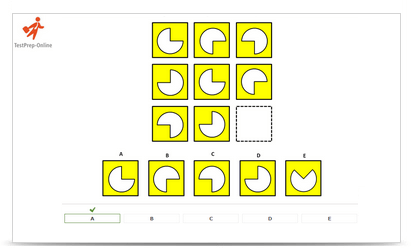Learn about Serial Reasoning questions found on the NNAT. Practice solving Serial Reasoning questions and utilize TestPrep-Online's explanations and solving tips. Good luck!
Serial Reasoning questions assess the test taker’s ability to supply a missing element in a given matrix comprised of geometric shapes. Each matrix is composed of nine boxes in a three-by-three grid. The test taker is to determine which answer choice belongs in the empty box in the bottom right-hand corner of the grid.
Serial Reasoning Sample Questions
Below there are two sample questions suited to NNAT Serial Reasoning questions, followed by full solutions.
Identify the image which completes the pattern by examining how the series of shapes change across the rows and down the columns of the matrix. The direction in which you examine the question should depend on where you can most easily visualize the relationship.
Question 1
Which figure completes the pattern?

Answer and Explanation
The correct answer is A.
Across the rows, the sectors rotate 90 degrees (1/4 of a circle) clockwise. Down the columns, the sectors rotate 90 degrees counterclockwise. Rotating the sector in the bottom-middle frame counterclockwise 90 degrees will result in a sector which opens towards the top-right corner of the frame (answer choice A).
Question 2
Which figure completes the pattern?

Answer and Explanation
The correct answer is E.
The matrix is composed of three types of figures and three background colors. Across the rows, the top row contains a blue background, the middle row contains a yellow background, and the bottom row contains a white background. We can eliminate answer choice C as it contains a blue background. Additionally, the bottom row contains yellow figures. We can eliminate answer choices A and B, as they contain blue figures.
Notice that each row and column contain one of each types of figures (a square with two diagonal lines, a square with a horizontal and vertical line, and a diamond with a horizontal and vertical line). The right column and bottom row each include a diamond with a horizontal and vertical line and a square with two diagonal lines. Thus, the answer choice will contain a square with a horizontal and vertical line. We are left with answer choice E.
How to Solve Serial Reasoning Questions
Explain the concept of a matrix to your child. It is important that s/he understands that s/he needs to search for patterns both across the rows and down the columns and determine which answer choice is the missing figure in the bottom right-hand corner of the grid.
Familiarize your child with the different types of changes which commonly occur throughout the matrices. Common changing characteristics in these types of questions include the following: Changing colors/shading, re-appearing/disappearing shapes, rotational movements (clockwise/counterclockwise), and figures that remain constant.
Practice eliminating incorrect answer choices. This will teach your child to get comfortable with the testing format and better bypass common pitfalls.
Try a step-by-step approach. For children who are being exposed to these types of questions for the first time, it is helpful to solve the problems step by step:
- Look at the first row closely. Is there a pattern?
- Does a similar pattern appear in the second row? Does this pattern continue in the first two boxes in the third row? If so, you have probably found the correct pattern.
- Before looking at the answer choices, imagine what the answer choice could be based on step 2. If you did not find a pattern by examining the rows, look at the columns and repeat steps 1 through 3.
Common Mistakes and How to Avoid Them
Serial Reasoning questions require attention to detail and pattern recognition. Because of that, it is important to understand this type of question prior to the exam.
Mistakes occur when students do not grasp concepts of rotational image flipping, color changing or they just cannot figure out the pattern. Practicing in advanced is a sure way to understand the basics behind these questions. Once a student controls the basics, figuring out a pattern becomes easier.
Luckily, you can help your child practice Serial Reasoning. In order to practice rotation of objects, you can take everyday objects and flip them. Then, ask your child how they have been flipped (for example – you can take a pair of shoes and put one in front of the other).
You can draw on paper images that require pattern recognition. Start with easier patterns like drawing a small square and a large square and ask your child to describe what have changed.
NNAT Video Academy
Serial Reasoning questions can be difficult. The NNAT Video Academy is designed to teach your child strategies to solve all the different question types that appear on the NNAT, including Serial Reasoning questions. The Video Academy is included in every Premium Pack.
To continue with the NNAT Video Academy, purchase any NNAT Premium Pack.
Try additional NNAT Serial Reasoning questions



